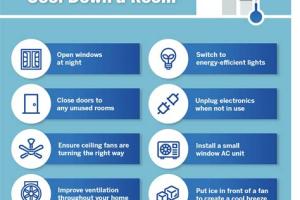Ultimate Guide: How to Keep Your Room Cool Without Air Conditioning

-
Quick Links:
- Introduction
- Understanding Heat in Your Room
- Passive Cooling Techniques
- Active Cooling Methods
- Insulation and Sealing Your Room
- Using Fans Effectively
- Case Studies and Examples
- Expert Insights
- FAQs
- Conclusion
Introduction
Keeping a room cool during the hot summer months can be a challenge, especially when you want to avoid the high costs of air conditioning. Fortunately, there are numerous practical methods you can employ to maintain a comfortable environment in your living space. This comprehensive guide will explore both passive and active cooling strategies, share case studies, and provide expert insights to help you stay cool all summer long.
Understanding Heat in Your Room
Before diving into cooling methods, it's essential to understand how heat enters and affects your room. Several factors contribute to indoor heat, including:
- Sunlight: Direct sunlight through windows can significantly raise indoor temperatures.
- Insulation: Poorly insulated spaces allow heat transfer from outside to inside.
- Appliances: Electronics and appliances generate heat that can elevate room temperatures.
- Humidity: High humidity levels can make a room feel warmer than it is.
Passive Cooling Techniques
Passive cooling relies on natural methods to reduce indoor temperatures without mechanical systems. Here are some effective strategies:
1. Window Treatments
Using reflective blinds or blackout curtains can block sunlight, thereby preventing heat accumulation. Consider using:
- Light-colored curtains to reflect sunlight
- Thermal curtains to enhance insulation
2. Ventilation
Natural ventilation helps to circulate air and reduce heat. Open windows during cooler times of the day, like early morning and late evening, to allow cooler air in.
3. Landscaping
Planting trees or installing trellises with climbing plants can provide natural shade to your home, helping to keep it cool.
Active Cooling Methods
Unlike passive cooling, active methods involve mechanical systems or appliances. Here are some options:
1. Fans
Ceiling fans and portable fans can create a wind-chill effect that makes you feel cooler. Positioning fans strategically can enhance airflow throughout the room.
2. Air Conditioning Units
If you choose to use air conditioning, consider energy-efficient models and maintain them regularly to ensure optimal performance.
3. Evaporative Coolers
These devices use water evaporation to cool the air. They are particularly effective in dry climates.
Insulation and Sealing Your Room
Proper insulation is crucial in maintaining a cool room. Here’s how to enhance insulation and sealing:
- Seal gaps around windows and doors using weatherstripping.
- Insulate walls, attics, and basements to minimize heat transfer.
- Use door sweeps to block hot air from entering under doors.
Using Fans Effectively
Fans can be a cost-effective way to cool your room. Here are some tips for using them efficiently:
1. Ceiling Fan Direction
In summer, set your ceiling fan to rotate counterclockwise to create a cooling breeze.
2. Box Fan Technique
Place a box fan in a window facing outwards to push hot air out while drawing cooler air in through other windows.
Case Studies and Examples
Consider the following case studies that illustrate the effectiveness of various cooling techniques:
1. Home in Texas
A family in Texas implemented a combination of window treatments and landscaping. They planted trees and used reflective window films, reducing their cooling costs by 30%.
2. Apartment in New York
An apartment resident installed a portable evaporative cooler and used window fans to circulate air, achieving significant comfort during a heatwave.
Expert Insights
We spoke with HVAC experts who provided valuable advice on keeping your room cool:
"The key to a cool living space is a combination of insulation, ventilation, and smart use of cooling devices. Always consider energy efficiency to reduce costs." - Jane Doe, HVAC Specialist
FAQs
1. What are the best ways to keep a room cool without AC?
Utilize window treatments, enhance ventilation, and use fans effectively.
2. Do plants help cool a room?
Yes, plants can lower temperatures through evapotranspiration and provide shade when placed strategically outside.
3. How can I insulate my room on a budget?
Use weatherstripping, door sweeps, and thermal curtains to improve insulation affordably.
4. Are there specific fan settings that are more effective?
Set ceiling fans to rotate counterclockwise in summer for a cooling breeze.
5. Can evaporative coolers work in humid climates?
They are less effective in humid areas, as the air already contains moisture, which can reduce their cooling capability.
6. What time of day should I open my windows?
Open windows during the cooler parts of the day, such as early morning or late evening.
7. How much can I save by using natural cooling methods?
Many households report savings of 20-50% on cooling costs by implementing these strategies.
8. Is it better to use multiple small fans or one large fan?
Multiple small fans can provide better airflow throughout the room compared to one large fan.
9. What role does humidity play in cooling a room?
High humidity can make a room feel warmer than it is, while lower humidity levels can enhance comfort.
10. How can I cool a room quickly?
Use fans strategically, close blinds to block sunlight, and open windows during cooler hours to increase airflow.
Conclusion
Staying cool in your room without air conditioning is achievable through a blend of passive and active cooling techniques. By understanding how heat enters your space and utilizing effective methods to mitigate it, you can create a comfortable environment all summer long. Implement these strategies to enjoy a cooler home while saving on energy costs!
References
Random Reads
- How to write a batch file
- How to write a use case
- Mastering rounding in excel
- Recover permanently deleted files windows 10
- How to remove personal information from the internet
- How to hide pipes
- How to hide messages on android
- Mastering five nights at freddys 3
- Mastering gender selection sims 3
- How to transfer contacts from iphone to gmail